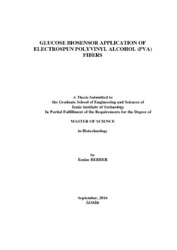Please use this identifier to cite or link to this item:
https://hdl.handle.net/11147/4839| Title: | Glucose Biosensor Applicatiın of Electrospun Polyvinyl Alacohol (pva) Fibers | Other Titles: | Polivinil Alkol (pva) Elektroeğirme Liflerin Glukoz Biyosensörü Uygulaması | Authors: | Berber, Emine | Advisors: | Demir, Mustafa Muammer Yıldız, Ümit Hakan |
Keywords: | Polyvinyl alcohols Nanofibers Membrane Glucose oxidase Electrospun fibers |
Publisher: | Izmir Institute of Technology Izmir Institute of Technology |
Source: | Berber, E. (2016). Glucose biosensor applicatiın of electrospun polyvinyl alacohol (PVA) fibers. Unpublished master's thesis, İzmir Institute of Technology, İzmir, Turkey | Abstract: | Electrospinning is a simple and versatile technique for the fabrication of polymeric nanofibrous membranes with high surface to volume ratio. Besides the large surface area of the fibrous membranes, their dimensional stability and flexibility allows the immobilization of biomolecules on to the nanofiber surfaces. Therefore, electrospun nanofibers have been extensively used in enzyme electrodes. This thesis examines the glucose biosensor application of electrospun polyvinyl alcohol (PVA) nanofibers – carbon nanotube (CNT) nanocomposite membranes. By manipulating the structural design and the composition of the nanocomposite membranes, glucose sensing efficiency of the five different enzyme electrodes a) Glucose oxidase (GOx) immobilized PVA electrospun electrode, b) Glucose oxidase (GOx) immobilized PVA electrospun electrode containing multi-walled carbon nanotube (MWCNT), c) Glucose oxidase (GOx) immobilized PVA electrospun electrode containing Poly(diallyldimethylammonium chloride) (PDDA) functionalized multi-walled carbon nanotube (MWCNT) d) Glucose oxidase (GOx) immobilized PVA electrospun electrode containing Poly(diallyldimethylammonium chloride) (PDDA) functionalized single-walled carbon nanotube (SWCNT), e) Interfacially cross-linked PVA electrospun electrode containing Poly(diallyldimethylammonium chloride) (PDDA) functionalized multi-walled carbon nanotube (MWCNT) were comperatively studied. PVA electrospun nanofibers were fabricated by using electrospinning technique. Morphology and average diameter of the fibers were characterized by using Scanning Electron Microscopy (SEM). Average diameter for the neat PVA electrospun fibers were 115 nm. Carbon nanotubes were oxidatively functionalized by acid treatment and addition of functional groups after acid treatment was proved by using Raman Spectroscopy. Glucose sensing activities of the electrodes were amperometrically measured at an applied voltage -0.5 V (vs. Ag/AgCl) in 0.1M phosphate buffer solution (PBS pH 7). Glucose detection sensitivies of the electrodes were calculated as 19.6, 27.7, 67.5, 44.4, 4.0 μA mM-1cm-2 respectively. Elektroeğirme, çap ölçüleri nanometreden mikrometreye kadar değişebilen polimerik lif üretiminde kullanılan basit ve çok yönlü bir yöntemdir. Son derece küçük çap ölçüleri nedeniyle, yüksek yüzey/hacim oranına sahip olan elektroeğirme nanolifler, aynı zamanda yapısal olarak sağlam ve esnek yapılardır. Bu özelliklerine bağlı olarak, elektroeğirme nanolifler, biyomolekül tespiti için uygun malzemelerdir ve enzim tabanlı biyosensör uygulamalarında sıklıkla kullanılmaktadırlar. Bu tez çalışması, polivinil alkol (PVA) elektroeğirme lif – karbon nanotüp (CNT) nanokompozit malzemelerin glukoz biyosensor uygulamasını içermektedir. Çalışmada, içerik ve yapı olarak farklı beş sensör elektrodu, glukoz algılama aktivitelerine göre karşılaştırmalı olarak çalışıldı. Elektrotlar a) Glukoz Oksidaz (GOx) içeren PVA elektroeğirme elektrot, b) Glukoz Oksidaz (GOx)- Çok katmanlı karbon nanotüp (MWCNT) içeren PVA elektroeğirme elektrot, c) Glukoz Oksidaz (GOx) ve poli dialil dimetil amonyum klorür (PDDA) ile modifiye edilmiş çok katmanlı karbon nanotüp (MWCNT) içeren PVA elektroeğirme elektrot, d) Glukoz Oksidaz (GOx)- poli dialil dimetil amonyum klorür (PDDA) ile modifiye edilmiş tek Katmanlı karbon nanotüp ( SWCNT) içeren PVA elektroeğirme elektrot, e) Arayüzey çapraz bağlanmış ve Glukoz Oksidaz (GOx)- poli dialil dimetil amonyum klorür (PDDA) ile modifiye edilmiş çok Katmanlı karbon nanotüp (MWCNT) içeren PVA elektroeğirme elektrot olarak adlandırıldı. PVA nanolifler, elektroeğirme yöntemi kullanılarak üretildi. Nanoliflerin morfoloji ve ortalama çap uzunlukları, Taramalı Elektron Mikroskopu (SEM) kullanılarak gözlemlendi ve nanoliflerin ortalama çap uzunluğu 115 nm olarak belirlendi. Karbon nanotüp oksidatif yüzey modifikasyonunun sağlanması amacıyla, karbon nanotüpler asit ile muamele edildi ve öngörülen karbon nanotüp yüzey modifikasyonu, Raman Spektroskopisi kullanılarak gözlemlendi. Elektrotların glukoz algılama aktiviteleri amperometrik olarak -0.5 V potansiyel fark uygulanarak, 0.1 M fosfat tampon çözeltisi (PBS, pH 0.7) içerisinde gerçekleştirildi. Üretilen a-b-c-d-e sensor elektrotlarının glukoz algılama hassasiyetleri ise sırasıyla 19.6, 27.7, 67.5, 44.4, 4.0 μA mM 1 cm 2 olarak tespit edildi. |
Description: | xiii, 84 leaves Thesis (Master)--Izmir Institute of Technology, Biotechnology, Izmir, 2016 Full text release delayed at author's request until 2018.09.30 Includes bibliographical references (leaves: 73-84) Text in English; Abstract: Turkish and English |
URI: | http://hdl.handle.net/11147/4839 |
| Appears in Collections: | Master Degree / Yüksek Lisans Tezleri |
Files in This Item:
| File | Description | Size | Format | |
|---|---|---|---|---|
| T001489.pdf | MasterThesis | 4.66 MB | Adobe PDF |  View/Open |
CORE Recommender
Page view(s)
768
checked on Apr 14, 2025
Download(s)
394
checked on Apr 14, 2025
Google ScholarTM
Check
Items in GCRIS Repository are protected by copyright, with all rights reserved, unless otherwise indicated.